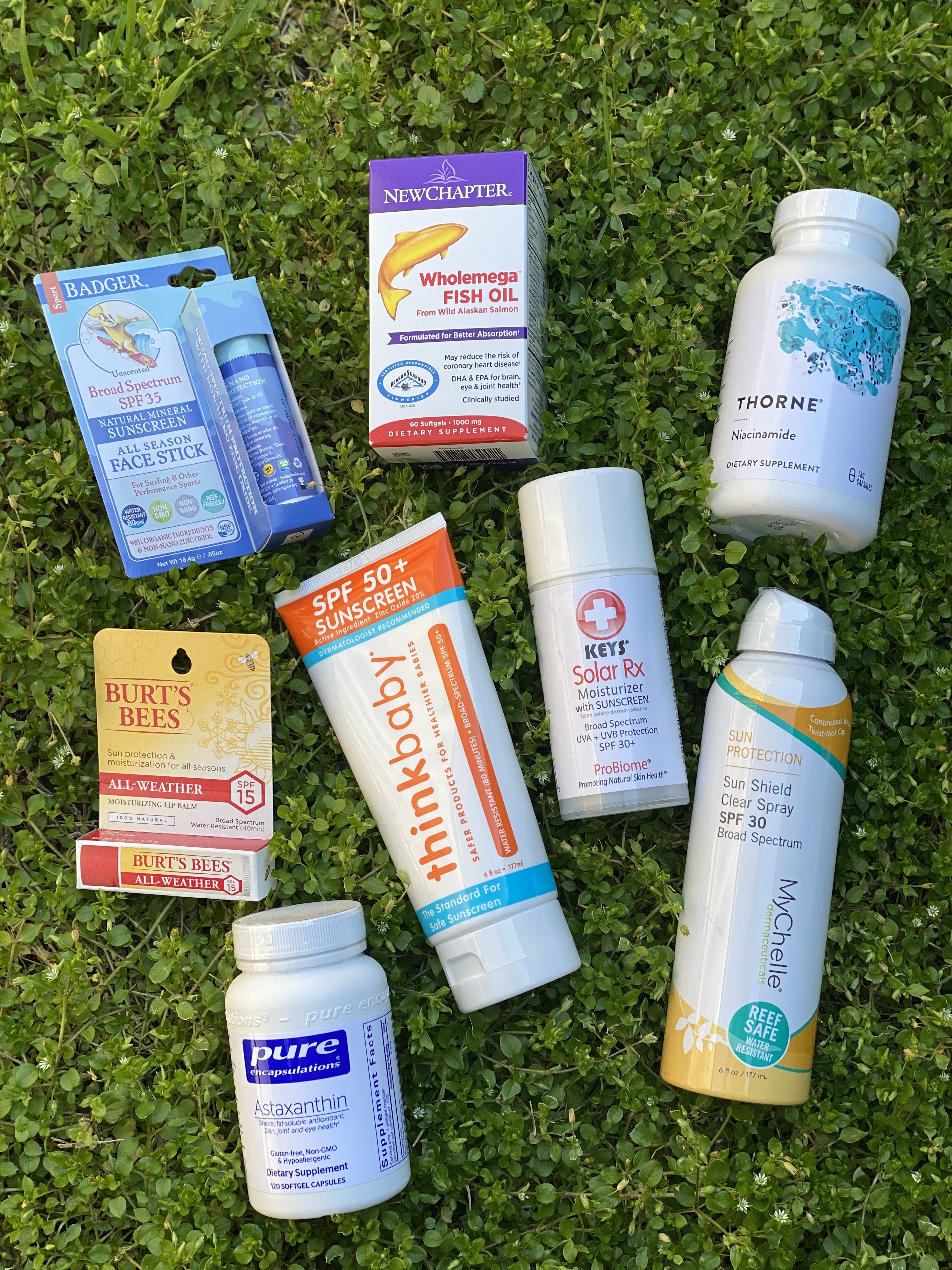 Spring is here, and summer is just around the corner. That means more time spent outside, enjoying quintessential Austin like the Butler Hike-and-Bike Trail, paddle boarding on Lady Bird Lake, and swimming at Barton Springs. With more outside time, it’s very important to protect yourself and your family from the sun and its ultraviolet rays which can cause sunburn and future damage to your skin.
Spring is here, and summer is just around the corner. That means more time spent outside, enjoying quintessential Austin like the Butler Hike-and-Bike Trail, paddle boarding on Lady Bird Lake, and swimming at Barton Springs. With more outside time, it’s very important to protect yourself and your family from the sun and its ultraviolet rays which can cause sunburn and future damage to your skin.
As a medical/oncologist esthetician and wellness specialist, I use organic sunscreens and oral supplements to protect both myself and my clients’ skin. With the right combination of sunscreen and supplementation, you can enjoy the outdoors while preventing sun damage and reducing your risk of skin cancer.
Sunscreen and Sunblock
The most important thing to consider before jumping into outdoor activities is to use a good sunscreen or sunblock. What is the difference between a chemical sunscreen and a physical sunblock? Chemical sunscreens are applied to the skin and absorb ultraviolet rays from the sun. The active ingredients in chemical sunscreens include avobenzone, octinoxate, and oxybenzone.
Physical sunblock remains on top of the skin and reflects the sun’s rays. The active ingredients in sunblock include titanium dioxide or zinc oxide. Use a sunblock if you have fair or sensitive skin or will be outside for long periods of time.
If you prefer to limit your exposure to these chemicals, organic sunblock is the ideal choice as it contains only natural ingredients. There are great products on the market to choose from that don’t contain the chemicals found in most sunscreens. When purchasing a sunscreen, look for the following when examining the label:
– Broad spectrum protection from both UVA and UVB rays
– Paraben-free
– Fragrance-free
– Non comedogenic (won’t clog pores)
– Oil-free or moisturizing
– SPF of at least 30 or higher
You can trust that sun protection products sold at Peoples Rx are safe and effective! Some of our favorite brands include Thinksport, MyChelle, Keys, and All Good. Check out the annual sunscreen guide from the Environmental Working Group for more on highly-rated products when it comes to safe ingredients.
Oral Supplements
While sunscreen or sunblock is essential to protecting yourself from the sun’s harmful rays, there are additional ways to support the health of your skin. Oral supplements do not directly protect the skin from sun damage, but instead complement the use of sun protection by increasing antioxidants in the body.
Antioxidants are substances that can prevent or slow damage to cells caused by free
radicals that the body produces as a reaction to sun exposure. Commonly called “King of the Carotenoids,” astaxanthin is a potent antioxidant found naturally in certain algae and causes the pink color in salmon, trout, and flamingos. Astaxanthin has been shown in clinical studies to increase skin moisture retention and elasticity, and has anti-aging properties. It also has significant UV-blocking properties, which helps the skin protect itself against sun-related damage. Astaxanthin helps to neutralize multiple free radicals at once, protecting your skin and body from oxidation, damage, and inflammation. You can find Astaxanthin from Pure Encapsulations at Peoples.
Also known as nicotiname or vitamin B3, Niacinamide is a water-soluble vitamin that works with your skin to visibly improve the appearance of large pores, uneven skin tone, fine lines, wrinkles, and dullness of the skin. Most importantly, it reduces environmental damage and helps repair signs of past damage. Niacinamide helps to build keratin and ceramides, which keep the skin firm and healthy and help it retain moisture. Niacin-specific products, as well as B complexes containing niacinamide, can be found at Peoples as well.
Finally, essential fatty acids like omega-3 and omega-6 are the building blocks of healthy cell membranes, and key to a natural skincare regimen. They help produce the skin’s natural oil barriers, which are critical in keeping skin hydrated, plumper, and younger looking.
Supplements are not a replacement for sun protection, but rather should be used as a bonus in addition to regular usage of sunscreen and/or sunblock. The best way to protect yourself from the sun is avoiding intense sunlight and wearing sun protective clothing including hats while out and about. And remember to reapply sunscreen every 2-3 hours! Happy spring break!
 Veronica Barrios is a Certified Clinical Oncologist Esthetician. With a specialization in skin cell rejuvenation and oncological restoration, she provides highly effective results-oriented treatments. Her skincare regimens incorporate micro-dermabrasion, micro-current therapy, medical grade skin peels, LED therapy, Dermapen, and CryoStem Cell therapy. She earned a certified degree in Wellness and Nutrition from the Institute of Integrative Nutrition. Realizing that many skin care issues are nutrition or health related and being a thyroid cancer survivor herself, Veronica has worked with many cancer patients and others seeking to restore balance in their skin and lives.
Veronica Barrios is a Certified Clinical Oncologist Esthetician. With a specialization in skin cell rejuvenation and oncological restoration, she provides highly effective results-oriented treatments. Her skincare regimens incorporate micro-dermabrasion, micro-current therapy, medical grade skin peels, LED therapy, Dermapen, and CryoStem Cell therapy. She earned a certified degree in Wellness and Nutrition from the Institute of Integrative Nutrition. Realizing that many skin care issues are nutrition or health related and being a thyroid cancer survivor herself, Veronica has worked with many cancer patients and others seeking to restore balance in their skin and lives.
If you have comments and/or questions about this blog, email us at blog@peoplesrx.com.
